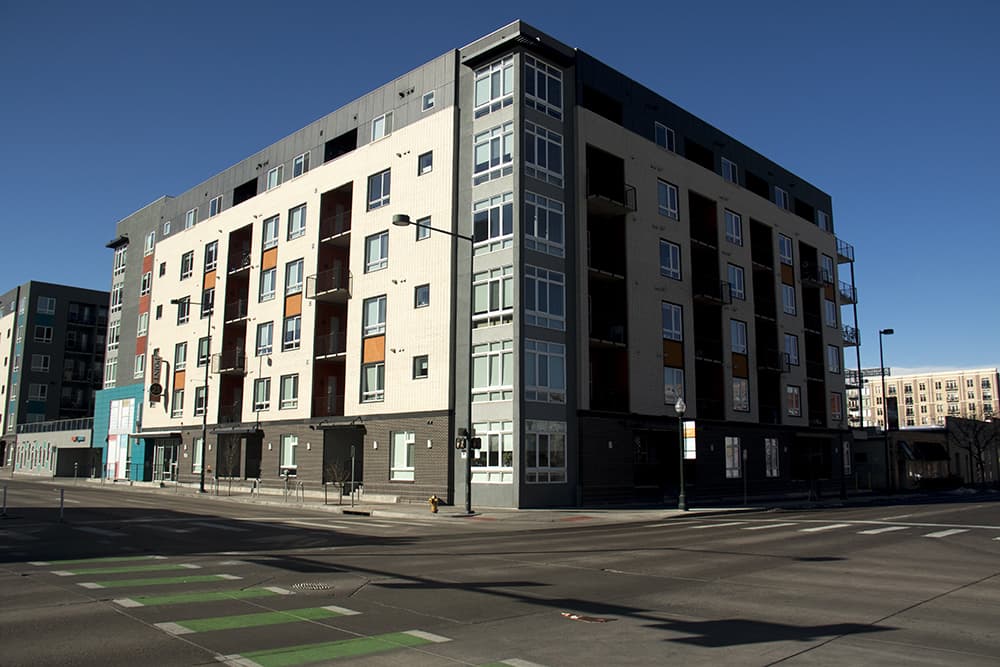
When the Denver City Council created the affordable housing fund last year, it was pitched as an essential first step – and also inadequate to address the city's housing crisis. The $15 million a year expected to be raised by fees on new construction and a half-mill property tax levy should build or preserve about 6,000 affordable units in a city where an estimated 87,000 people struggle to pay their rent.
All In Denver, a 140-member group that includes people who work in community development, housing, education and the arts, wants the city to do much more, much more quickly to address affordable housing, including $100 million for affordable housing in the 2017 general obligation bond that Denver will present to voters this November.
With that kind of money, "you could make a difference in three to five years before the market fundamentally changes this city," said Brad Segal, a founding member of All In Denver and executive director of Progressive Urban Management Associates.
Currently, the 2017 GO bond is intendend for infrastructure: sidewalk improvements, rec center renovations, new parks and libraries, intersection safety upgrades. The city has convened a series of working groups to comb through thousands of community requests to put together a package of projects worth between $500 million and $600 million.
The GO bond is not the place to address housing, said Amber Miller, a spokeswoman for the Mayor's Office.
"The GO Bond is not the appropriate avenue, as a general obligation bond funds city assets and the city does not own or manage affordable housing," she said in an email. "The city mainly provides gap financing to spur affordable housing."
The idea of bonding off the half-mill property tax levy approved last year or doing a separate housing bond is one the city has heard, and it "continues to percolate," Miller said. But there are no specific proposals under consideration right now.
Council President Albus Brooks, who helped shepherd the affordable housing fees and mill levy to final approval, said a better way to get more money for affordable housing would be to refinance the remaining debt on the 2007 general obligation bonds and reinvest the savings.
But voters in Oakland, California, just overwhelmingly approved a measure very similar to what All In Denver proposes: a $600 million bond package that dedicates $500 million to conventional infrastructure improvements and $100 million to housing, with the top priority being keeping existing residents in their neighborhoods.
In 2015, San Francisco voters approved a stand-alone housing bond measure to raise $310 million. In 2016, voters in Portland, Oregon, approved a $258 million housing bond, and voters in Alameda County, whose seat is Oakland, approved a $580 million housing bond.
Because these measures are so new -- San Francisco just issued the first bonds as part of the housing program last fall -- it's hard to assess their impact. And because it's generally the country's most expensive markets where governments and voters are willing to take big steps to address housing, expect market-rate housing to remain very expensive in those cities.
Segal said that All In Denver is open to discussing any additional funding sources. If the city doesn't want to talk about housing as part of the 2017 bond, the group may look at running a separate housing bond measure in 2018.
However, the group wants the city to start thinking about housing as infrastructure, the same way it thinks about roads and rail lines, parks and libraries, as infrastructure.
"Housing is just essential to the stability of the city," Segal said. "It's essential to the stability of neighborhoods, to the stability of the economy of the city. It's just a fundamental underpinning of the city. ... If we lose the diversity of the housing, we're going to lose any economic advantage the city has."
The city needs a large funding source sooner rather than later because prices are rising so rapidly, he said. Wait, and it may be too late.
And housing as infrastructure doesn't mean large-scale public housing of the sort that came to be seen as a failed government policy in the latter half of the 20th century. Segal said one of the fastest ways the city could make a difference is by using public money to engage in land banking while prices are still relatively affordable. Land banking can be used to preserve sites for future affordable and mixed-income housing developments built through public-private partnerships, and it can also be used to slow gentrification by keeping the land under existing neighborhoods from increasingly rapidly in value.
Segal said All In Denver didn't start with the goal of promoting a housing bond.
After the 2015 election, a number of people who had long been involved in economic development in the city started to worry that development hasn't always served the broader interests of the community. They started working with housing advocates to develop ideas that would keep Denver economically diverse without becoming anti-development.
A larger housing fund could also support significant transitional and long-term supportive housing programs for the homeless, as well as housing assistance for people in theoretically middle-class jobs who are being priced out of the city, Segal said.
These are populations that the existing permanent affordable housing fund should also help, but on a much smaller scale. (The city is working on a more concrete plan that will go to council later this year.)
Mayor Michael Hancock has shifted some of his focus to transportation, and at the City Council retreat in January, council members also talked extensively about using the 2017 bond to address long-standing transportation needs.
Segal said he recognizes that thinking of housing as public infrastructure would be a change, but that's been true of other major investments the city has made in the past.
"That's what people said about the airport in the '80s. That's what people said about transit in the aughts," he said.
Segal said the permanent fund created last year can't be the end of the city's investment in housing.
"There was a lot of rhetoric that this was a crisis and the city needs to mobilize resources to combat it," he said of last year's housing debate. "And they rightfully used that rhetoric to pass the dedicated fund, and we believe it continues to be a crisis."












